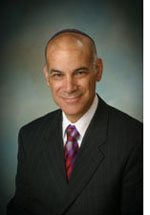|
By Rabbi Leonard Rosenthal
 SAN DIEGO—When we chant the Torah aloud during services there is a general rule that neither an aliya nor a parasha can conclude with a negative thought. An aliya and parasha may conclude with a positive or neutral verse; concluding with sad or angry words would leave congregants feeling depressed! SAN DIEGO—When we chant the Torah aloud during services there is a general rule that neither an aliya nor a parasha can conclude with a negative thought. An aliya and parasha may conclude with a positive or neutral verse; concluding with sad or angry words would leave congregants feeling depressed!
It is therefore difficult to understand the very last words of this week's parasha, Nitzavim-Vayelech. Moses tells the Israelites that soon they will be crossing the Jordan into the Promised Land but he will not be joining them. What are his final words to them? The are found in an epic poem found in parashat Ha'azinu which we will read the week after Rosh Hashana. This week's parasha, however, closes with Moses' introduction to the poem:
"Gather to me all the elders of your tribes and your officials, that I may speak all these words to them and that I may call heaven and earth to witness against them. For I know that, when I am dead, you will act wickedly and turn away from the path that I enjoined upon you, and that in time to come misfortune will befall you for having done evil in the sight of the Lord and vexed Him by your deeds." (Deut. 31:28-29) If that's not a depressing ending to a parasha, I don't know what
Go to the top of next column
|
|
is! After we hear it in the synagogue won't we walk away feeling that all change is futile since in the end we are destined to stray from God? Yes, but only if we believe that we once we
move away from God we can never come back!
In addition to telling us about the inevitability of human failure in parashat Nitzavim-Vayelech, Moses also tells why we must remain optimistic:
"When all these things befall you...and you return to the Lord your God, and you and your children heed His command with all your heart and soul... then the Lord your God will restore your fortunes and take you back in love." (Deut. 30:1-2)
This is also the central message of the High Holy Days which begin next Friday night: "...and you return to the Lord your God, and you and your children heed His command with all your heart and soul... then the Lord your God will restore your fortunes and take you back in love." No matter how wrongly our lives have turned, we can decide to right our wrongs and beg forgiveness from those we have hurt and from God above.
We enter this period with trepidation but exit it in exaltation knowing that God will forgive us. As God told Moses in the Torah: "I have pardoned them as you have asked." (Num. 14:20) We have God's promise of forgiveness of the truly penitent in advance! Our obligation and task is to be worthy of it.
Judy and I wish you a healthy, happy, and fulfilling New Year. May God bless you and all those you love in this New Year and in all the years to come.
|
|

